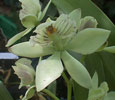|
|
|
|
|
| |
Flasks of
Anacheilium radiatum 'MC2608' -spontaneous |
|
| |
|
|
| |
| Number: |
TN4342 |
| Name: |
Anacheilium radiatum 'MC2608' -spontaneous
(Acquired incorrectly named as Encyclia fragrans. The correct species is also known as Prosthechea radiata or Encyclia radiata.)
|
| Type: |
spontaneous (What's that?) |
|
Seed Donor: |
Luis A. Valera, Luis' Orchids
(Email: luisxx@animail.net)
|
|
Click to Enlarge

Pod Parent Flower |
Click to Enlarge

Pod Parent Blooming Plant |
|
|
|
| |
Culture Notes from Donor: Parent plant: Temperature range CI (58-75°F). Easy to grow; it is grown in a basket using regular orchid bark mix, and is watered at least once a day during the summer months.
Comments: Parent plant: From Mexico. Medium-sized plant.
For additional origin/habitat information supplied courtesy of
Charles and Margaret Baker, see further below, near the bottom of this page.
|
Temperatures we attempt to use in the lab & greenhouse:
| For Species: |
|
Spring, Summer, Autumn, Winter: days average 73°F, nights 56°F; best fit is Cool-Intermediate 75-58°F
(Source:
Baker's Web OSC) |
|
About the name...
| Etymology of |
Anacheilium |
|
From latinized Greek "ana" upper side; "cheilos" lip. The lip is not resupinated, and is therefore on the upper side.
(Source:
Mayr & Schmucker 1998) |
| Etymology of |
radiatum |
|
From Latin "radiatus" with beams, ray-shaped.
(Source:
Mayr & Schmucker 1998) |
| Pronunciation of |
Anacheilium |
|
an-a-KYE-lee-um
(Source:
Hawkes 1978) |
| Pronunciation of |
radiatum |
|
ra-dee-AH-tum
(Source:
Hawkes 1978) |
|
If you would like to direct someone to this web page, please copy and paste this URL into your email:
http://troymeyers.com/d?014342
| Flask Information |
| Availability: |
We have sold all of the flasks for this item. |
| You should: |
Consider getting individual plants or compots instead of a flask.
You can place a "Notify Flask Recipients" Request, and either we or a flask recipient may contact you when plants are available.
You may also place a "Notify Retries" Request, and if an identical pollination (the same parents) is done again, we'll let you know.
You may reserve a flask, but it's very unlikely you'll get one ...this could only happen if we found a flask that we didn't know we had. |
| Yield Estimate: |
270 plants (based on flask surveys done 01/06/2005 )
|
| Plantlet Sizes: |
From many flasks 15 - 90 mm plants (based on flask surveys done 01/06/2005 through 07/08/2005)
From one most recently surveyed flask 40 - 60 mm (07/08/2005)
|
|
You might also want to:
|
View the seed assay for this item.
View items of the same species.
View items of the same genus.
|
| Ordering Information |
| You are not currently logged in. |
|
You must be a registered user and be logged in to reserve a flask or place a notification request. Please log in:
|
|
|
|
|
|
| |
The origin/habitat information below is supplied courtesy of Charles and Margaret Baker
The following information is based on the name of the plant provided by the donor, and assumes that the name is correct. If the plant has been misidentified, then the following information may not be correct.
This text is copyrighted by the Bakers and may not be reproduced without permission.
ORIGIN/HABITAT: Mexico, Guatemala, and Honduras. In Mexico, plants are
found in the states of Chiapas, Oaxaca, Puebla, San Luis Potosí, Tabasco,
and Veracruz. In Guatemala, plants are found in the northeastern Petén
region, with collections made on the ruins at Tikal. Plants may be found
in oak, oak-pine, or tropical evergreen forests at 500-6550 ft. (150-2000
m).
More about this information and the Bakers...
|
|
|
| |
|
|
|